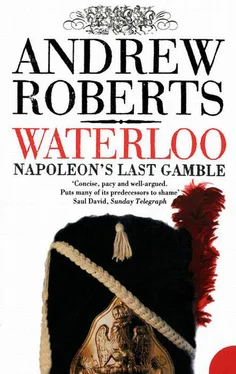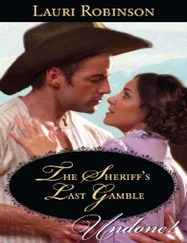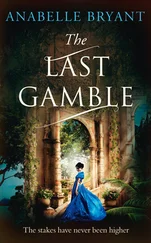Napoleon’s Last Gamble
MAKING HISTORY SERIES
Edited by Amanda Foreman and Lisa Jardine

To Robin Birley,
whose great-great-great-great-uncle,
Lord Castlereagh,
was the master-strategist of the coalition
that destroyed Napoleon
Cover Page
Title Page Waterloo Napoleon’s Last Gamble
Dedication To Robin Birley, whose great-great-great-great-uncle, Lord Castlereagh, was the master-strategist of the coalition that destroyed Napoleon
FOREWORD FOREWORD The Duke of Wellington described the English victory at the battle of Waterloo as ‘a damned nice thing – the nearest run thing you ever saw in your life’. As Andrew Roberts makes vividly clear in this gripping new account of the action leading up to and during the fateful battle of 18 June 1815, throughout that day the military advantage swung vertiginously towards and then away from Wellington’s forces as the battle raged. The loss of life on both sides was devastating – this was a battle in which in some senses both sides could be termed the losers. In the end, though, the victory and the lasting glory deservedly fell to Wellington. The outcome of the battle marked a crucial and lasting juncture in European history. Napoleon Bonaparte’s defeat at Waterloo was his final downfall and the end of his imperial dream. Wellington’s victory marked the beginning of a new English imperial adventure. The battle of Waterloo, then, was one of those milestones in history – a marker, a turning point, an epoch-making incident, a directional laser-beam of light from the past to the future – on which our understanding of the past depends. Andrew Roberts’s sharply-focused and economical account highlights the extraordinary way in which events on the ground at key moments in history shape forever what follows. Waterloo launches an exciting series of small books edited by Amanda Foreman and Lisa Jardine – ‘Making History’ – each of which covers a ‘turning point’ in history. Each book in the series will take a moment at which an event or events made a lasting impact on the unfolding course of history. Such moments are of dramatically different character: from the unexpected outcome of a battle to a landmark invention; from an accidental decision taken in the heat of the moment to a considered programme intended to change the world. Each volume of ‘Making History’ will be guaranteed to make the reader sit up and think about Europe’s and America’s relationship to their past, and about the key figures and incidents which moulded and formed its process. Amanda Foreman Lisa Jardine
INTRODUCTION
THE CAMPAIGN
THE BATTLE
Maps
1 The First Phase
2 The Second Phase
3 The Third Phase
4 The Fourth Phase
5 The Fifth Phase
CONCLUSION
APPENDIX I Major Robert Dick’s Letter from Brussels
APPENDIX II Captain Fortuné de Brack’s Letter of 1835
APPENDIX III The Duke of Wellington’s Waterloo Despatch
NOTES
CONCISE BIBLIOGRAPHY AND GUIDE TO FURTHER READING
INDEX
Acknowledgements
About the Author
Praise
By the same author
Copyright
About the Publisher
The Duke of Wellington described the English victory at the battle of Waterloo as ‘a damned nice thing – the nearest run thing you ever saw in your life’. As Andrew Roberts makes vividly clear in this gripping new account of the action leading up to and during the fateful battle of 18 June 1815, throughout that day the military advantage swung vertiginously towards and then away from Wellington’s forces as the battle raged. The loss of life on both sides was devastating – this was a battle in which in some senses both sides could be termed the losers. In the end, though, the victory and the lasting glory deservedly fell to Wellington.
The outcome of the battle marked a crucial and lasting juncture in European history. Napoleon Bonaparte’s defeat at Waterloo was his final downfall and the end of his imperial dream. Wellington’s victory marked the beginning of a new English imperial adventure.
The battle of Waterloo, then, was one of those milestones in history – a marker, a turning point, an epoch-making incident, a directional laser-beam of light from the past to the future – on which our understanding of the past depends. Andrew Roberts’s sharply-focused and economical account highlights the extraordinary way in which events on the ground at key moments in history shape forever what follows.
Waterloo launches an exciting series of small books edited by Amanda Foreman and Lisa Jardine – ‘Making History’ – each of which covers a ‘turning point’ in history. Each book in the series will take a moment at which an event or events made a lasting impact on the unfolding course of history. Such moments are of dramatically different character: from the unexpected outcome of a battle to a landmark invention; from an accidental decision taken in the heat of the moment to a considered programme intended to change the world. Each volume of ‘Making History’ will be guaranteed to make the reader sit up and think about Europe’s and America’s relationship to their past, and about the key figures and incidents which moulded and formed its process.
Amanda Foreman
Lisa Jardine
‘AFTER THE PUBLICATION of so many accounts of the battle of 18 June, it may be fairly asked on what grounds I expect to awaken fresh interest in a subject so long before the public.’ Those words were written by Sergeant-Major Edward Cotton of the 7th Hussars as long ago as 1849, in his preface to a guidebook to the battlefield entitled A Voice from Waterloo . True enough then, how much more true are they when applied to yet another book on the battle published a century and a half and over one hundred books later. The answer that Cotton gave then is the one I would also give today: that while there are still doubts, mysteries, debates and confusions about the battle – let alone tremendous national bias evident in its retelling – there is always scope for another account.
‘Never was a battle so confusedly described as that of Waterloo,’ wrote the Swiss historian (and Marshal Ney’s chief of staff) General Henri Jomini, and that is partly because it was such a momentous engagement. The Duke of Wellington himself likened the description of a battle to that of a ball – perhaps he had in mind the Duchess of Richmond’s famous one three days before Waterloo – where there is so much simultaneous movement of so many people across so large an area with so many different outcomes that to record it all from a single standpoint becomes nigh-impossible.
Yet what we can say for certain about the battle of Waterloo – that it ended forever the greatest personal world-historical epic since that of Julius Caesar – is easily enough to drive us on to want to discover more. The political career of Napoleon Bonaparte, that master of continental Europe whose life was nonetheless punctuated by the three islands on which he was born, was exiled and died, came to a shuddering and total halt on the evening of Sunday, 18 June 1815. The Grande Armée which he had led across the sands of Egypt, the meadows of Prussia, the plains of Iberia, the hamlets of Austria and the snows of Russia, was finally and completely routed on the slopes of Mont St Jean twelve miles south of Brussels.
Читать дальше













